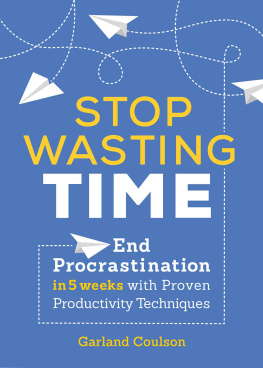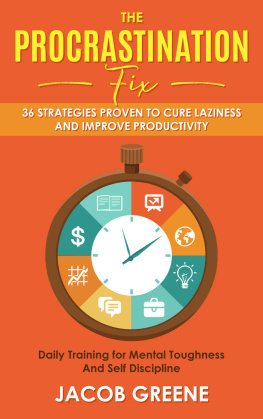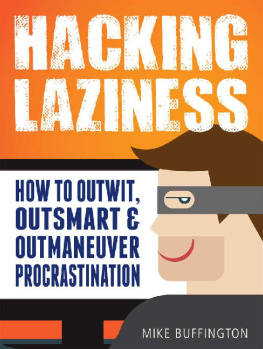Roman Gelperin (Author) - Addiction, Procrastination, and Laziness: A Proactive Guide to the Psychology of Motivation
Here you can read online Roman Gelperin (Author) - Addiction, Procrastination, and Laziness: A Proactive Guide to the Psychology of Motivation full text of the book (entire story) in english for free. Download pdf and epub, get meaning, cover and reviews about this ebook. year: 0, genre: Science / Business. Description of the work, (preface) as well as reviews are available. Best literature library LitArk.com created for fans of good reading and offers a wide selection of genres:
Romance novel
Science fiction
Adventure
Detective
Science
History
Home and family
Prose
Art
Politics
Computer
Non-fiction
Religion
Business
Children
Humor
Choose a favorite category and find really read worthwhile books. Enjoy immersion in the world of imagination, feel the emotions of the characters or learn something new for yourself, make an fascinating discovery.
- Book:Addiction, Procrastination, and Laziness: A Proactive Guide to the Psychology of Motivation
- Author:
- Genre:
- Year:0
- Rating:5 / 5
- Favourites:Add to favourites
- Your mark:
- 100
- 1
- 2
- 3
- 4
- 5
Addiction, Procrastination, and Laziness: A Proactive Guide to the Psychology of Motivation: summary, description and annotation
We offer to read an annotation, description, summary or preface (depends on what the author of the book "Addiction, Procrastination, and Laziness: A Proactive Guide to the Psychology of Motivation" wrote himself). If you haven't found the necessary information about the book — write in the comments, we will try to find it.
Addiction, Procrastination, and Laziness: A Proactive Guide to the Psychology of Motivation — read online for free the complete book (whole text) full work
Below is the text of the book, divided by pages. System saving the place of the last page read, allows you to conveniently read the book "Addiction, Procrastination, and Laziness: A Proactive Guide to the Psychology of Motivation" online for free, without having to search again every time where you left off. Put a bookmark, and you can go to the page where you finished reading at any time.
Font size:
Interval:
Bookmark:
Addiction,
Procrastination,
and Laziness:
AProactive Guide to the
Psychology of Motivation
By RomanGelperin
Copyright 2017 RomanGelperin
All rights reserved. Noportion of this book may be reproduced in any form without permission from thepublisher, except as permitted by U.S. copyright law. For permissions contact:
romangelperin@gmail.com
Download Abraham Maslows Seminal Essay onHuman Motivation for Free
As a token of thanks for buying my book, Id like to giveyou access to Abraham Maslows foundational essay on human motivation free ofcharge.

Follow the link below to getaccess:
www.romangelperin.com/maslowpdf
Maslows essay provides aninvaluable perspective on motivation, and is a highly recommended supplement tothis book.
In addition, youll also have anopportunity to receive exclusive access to my newest books, free books, andother valuable emails from me.
Again, follow this link tosign up:
www.romangelperin.com/maslowpdf
I wrote this short book backin 2013, after beating my head painfully, persistently against the thick wallof my motivational problems, and finally breaking out into full understanding,acceptance, and self-control. I dealt with these issues the same way I deal,and recommend dealing, with all psychological troubles: throughintrospectionthat is, by paying attention to the subtle workings of ones ownmind, identifying the roots of the problem, and devising the correspondingsolution.
I wrote this book as a type of self-help manual,targeting the most common motivational problems in the world today, againstwhich most people end up wrecking themselves, but that can be easily andeffectively solved by a correct understanding of their own minds. Other thanquitting cigarettes, I intimately experienced all the motivational problemsdescribed in this book.
The five examples in Chapter One are of compositepersons: based on my own personal introspections, and on my extensiveobservations of the people around me, who I saw struggling with the sameissues. As for the smoking example, I was never addicted to cigarettes, andtherefore never needed to quit. But from my countless observations of smokersaround meattempting, usually failing, and once again trying to quitI noticedtheir quandary had the same essential determinants as every other motivationalproblem, and could therefore be solved using the same methods.
Since writing this book, Ive applied everytechnique I advocate in it to my own life, and with amazing success. I onlyhope the hard-won insights I lay out on its pages will prove as useful to you,as they have been for me.
Over the course of our lives,we have all no doubt had a chance to observe certain anomalies in our ownbehavior. And I do not mean this in the sense of the overstated fact, so oftengaudily proclaimed by psychology students and enthusiasts, that humanbeings behave irrationally. What they refer to hardly manages to scratchthe surface of the archaic psychic mechanisms that are at play in the humanmind.
It isnt simply thatpeople behave or even think irrationally, but that the conscious control weexert over our behavior has sometimes partial, sometimes little, and sometimesno bearing on our manifest actions. For anyone who has paid this any dueattention, it is indeed hard not to get the impression that some antagonisticforces within us are constantly pushing, pulling, and determining our actions,no matter what our conscious intentions are, and in spite of any deliberateopposition we may put up. Nearly all self-observant persons will concede thatthey are not in full control of their behavior. And there are many who feelthat they truly have no control at all. In large part, they are correct.
It has been six weekssince Jim was assigned an eight-page paper for his American Literature class.He had thought about it frequently over the elapsedtime. He concluded that it would take no more than ten total hours to completeit. He had multiple times made a resolution to begin the paper, planning to getit out of the way early. He shunned those resolutions over and over again, andhasnt as much as written a word of it. Only now, in the dead of night, exactlyten hours before it is due, Jim begins feverishly writing and cobbling wordstogether. Every minute of the next ten hours Jim spends intensely working,taking no breaks to rest, watch television, or play videogames, as he isusually prone to doing. He feels stressed, irritated, exhausted, but in thecourse of those ten hours he manages to complete the paper and hands it inright on time.
Now Jim feels elated. He feels a huge relief, agrand weight lifted off his shoulders, he is ecstatic, he no longer feels tired despite staying up the extra ten hours to write thepaper. He thinks he can tackle anything, overcome any hurdle. Never again, hethinks, from now on I will never leave an assignment to the last minute andhave to spend such an excruciating time rushing to complete it. But, ofcourse, Jim is doomed to find himself repeating this process over and overagain; procrastinating for days, and weeks, and months before beginning hisassignments; and always waiting until the very last minute before hisassignment is due, and when stalling any longer would cause him to flunk it.
Without a doubt this is an extremely commonscenario, one which many of us have experienced at one time or another, if notperpetually so. So why does it happen? Why do we waste countless hours onunproductive, frivolous activities, when we know theres work to be done? Whycant so many of us resist the urge to procrastinate? What separates those ofus who do, from those who diligently complete all their work early or in atimely fashion? Why cant we force ourselves to work, even though we know itisnt worth the stress and anxiety that we will experience in rushing to do itat the last second? And, of course, the work itself then suffers on top ofthat. Many will conclude that they just have no willpower. And yet, in thosefinal moments right before the assignment is due, the willpower we call up to do it is nothing short of incredible. At those timeswe may feel that if only we could harness that motivation, we would be capableof anything. But no one would wish onto themselves the constant, feverishpressure of continuously having to complete a task under this type of harddeadline. And those whose job puts them in these kinds of conditions most oftengreatly resent it. There can, of course, be many negative physical andpsychological side-effects as well.
It is, however, possible to have the best of bothworlds: to be productive and proactive without the stress and strain that comeswith having to meet a deadline. And it has little to do with willpower;as we will soon see, willpower is only a skittish and insignificant factor. Whatit requires is an understanding of motivation. But lets leave this issuehanging for now and take in a few more examples.
Annemarie is trying tolose weight. She buys a membership to a local gym, and for the first two weeksshe goes there eagerly every day and gets an admirable workout. On the firstday of the third week she feels a reluctance to go, but she still manages topick herself up and visits the gym anyway. The day after that she decides thatit would be OK to skip a day, and doesnt go. And from that point forward, justas with so many people, she begins having an extremely hard time bringingherself to visit the gym. Most days she is unable to overcome this dreadfulfeeling and ends up failing to go at all. Soon she finds herself only going tothe gym once a week, then once every two weeks, and eventually she stops goingaltogether.
Font size:
Interval:
Bookmark:
Similar books «Addiction, Procrastination, and Laziness: A Proactive Guide to the Psychology of Motivation»
Look at similar books to Addiction, Procrastination, and Laziness: A Proactive Guide to the Psychology of Motivation. We have selected literature similar in name and meaning in the hope of providing readers with more options to find new, interesting, not yet read works.
Discussion, reviews of the book Addiction, Procrastination, and Laziness: A Proactive Guide to the Psychology of Motivation and just readers' own opinions. Leave your comments, write what you think about the work, its meaning or the main characters. Specify what exactly you liked and what you didn't like, and why you think so.











